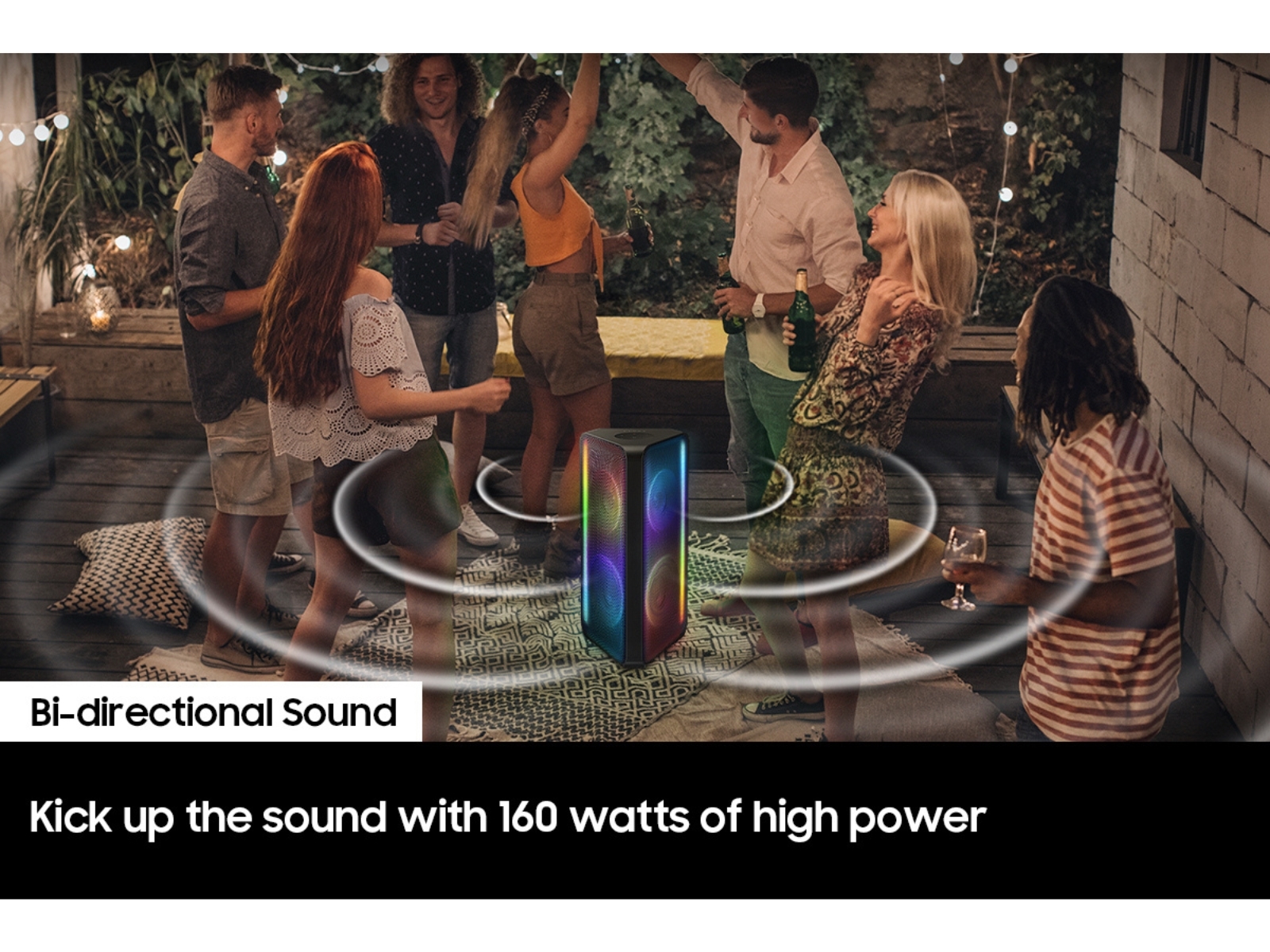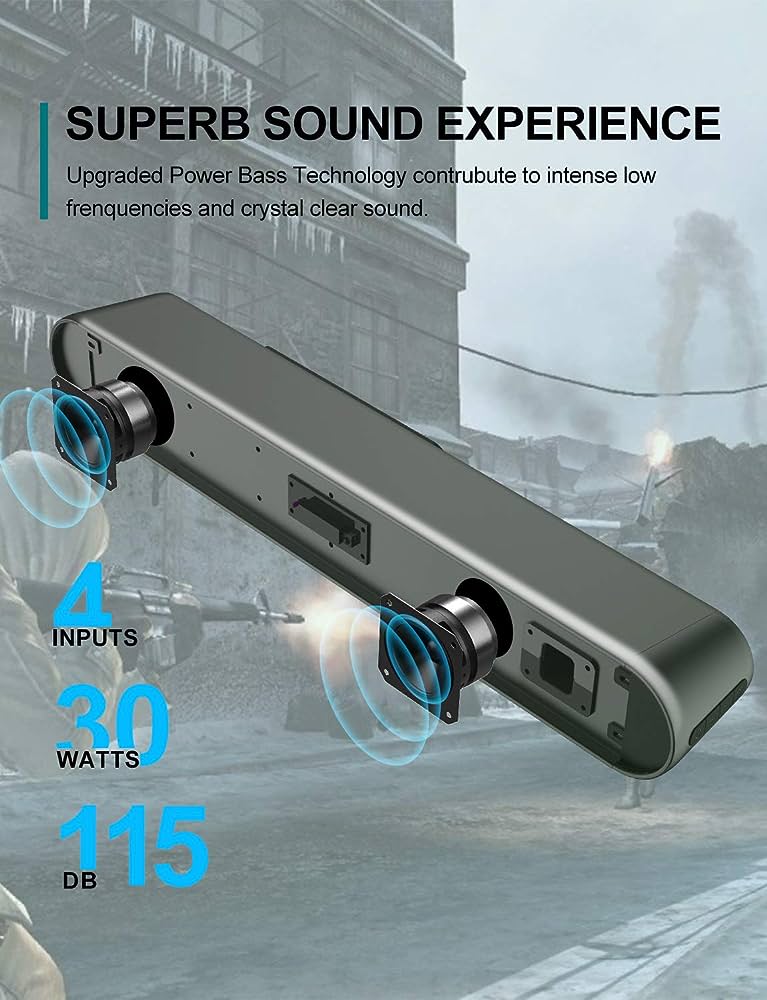When it comes to determining the wattage of a soundbar you need, it is important to consider factors such as the size of your room, your listening preferences, and if you have additional devices like subwoofers and rear speakers. A soundbar typically uses 20-50 watts on its own, but the wattage can increase with the addition of other devices.

Credit: www.samsung.com
Understanding Soundbar Wattage
A soundbar typically uses 20-50 watts on its own, but the wattage may increase if you have additional devices like subwoofers and rear speakers. Higher wattage can provide louder sound and a better sound field, but it’s important to listen to different soundbars to find one with the best sound for your needs.
Understanding Soundbar Wattage:
When it comes to soundbars, wattage plays a crucial role in determining audio quality and performance. Understanding soundbar wattage can help you choose the right soundbar for your needs. Here’s everything you need to know:
What Is Soundbar Wattage?
- Soundbar wattage refers to the amount of power that the soundbar can handle and output.
- It is measured in watts and indicates the soundbar’s maximum power capacity.
- Higher wattage generally means louder sound and better audio performance.
How Does Soundbar Wattage Affect Audio Quality?
- Soundbar wattage affects the overall loudness and clarity of sound.
- Higher wattage soundbars can produce louder volumes without distortion.
- They are more suitable for larger rooms or if you prefer to listen to music or movies at higher volumes.
- Lower wattage soundbars are suitable for smaller rooms or if you prefer lower volume levels.
How Many Watts Should A Good Soundbar Have?
- The ideal wattage for a soundbar depends on your specific needs and room size.
- For small to medium-sized rooms, soundbars with wattages ranging from 20 to 50 watts are usually sufficient.
- If you have a large room or prefer high volume levels, consider soundbars with higher wattages, such as 100 watts or more.
- Keep in mind that adding subwoofers and rear speakers to your soundbar setup will increase the overall wattage requirements.
How Many Watts Does A Soundbar Use?
- A soundbar typically uses 20 to 50 watts on its own.
- If you have additional devices like subwoofers and rear speakers, the wattage increases accordingly.
- It’s essential to consider the total power consumption when deciding on the wattage for your soundbar setup.
Understanding the wattage of a soundbar is crucial for selecting the right one that meets your audio needs. Whether you prefer higher volumes or have a smaller room, considering soundbar wattage will help you achieve excellent audio quality and a satisfying listening experience.
Factors To Consider When Choosing Soundbar Wattage
When choosing the wattage for a soundbar, it’s important to consider your specific needs. A soundbar typically uses 20-50 watts on its own, but if you plan to add subwoofers and rear speakers, you may need more wattage to accommodate the additional devices.
Factors To Consider When Choosing Soundbar Wattage:
Choosing the right wattage for your soundbar is crucial for achieving the best audio experience in your home. Here are some important factors to consider:
- Size of the room: The size of your room plays a significant role in determining the wattage you need for your soundbar. A larger room may require a higher wattage to fill the space with sound. On the other hand, a smaller room may not need as much wattage. Consider the square footage of your room when making your decision.
- Desired volume level: If you like to crank up the volume and experience room-filling sound, you may want to choose a soundbar with higher wattage. Higher wattage means more power and louder sound. However, if you prefer a lower volume, a soundbar with lower wattage may be sufficient for your needs.
- Additional audio equipment: Consider any additional audio equipment you have or plan to add to your soundbar setup. If you have subwoofers or rear speakers, they will require additional power, which may impact your wattage needs. Make sure to factor in the power requirements of these devices when choosing the wattage for your soundbar.
Remember that wattage alone is not the only factor that determines the audio quality of a soundbar. Other factors like speaker quality, audio processing technology, and the overall design of the soundbar also play a significant role. It’s important to read reviews and listen to demos to find the right soundbar that meets your specific needs and preferences.
By considering the size of your room, desired volume level, and additional audio equipment, you’ll be able to make an informed decision and find the perfect soundbar wattage for your home.
Recommended Wattage Range For Different Room Sizes
A soundbar typically requires 20-50 watts of power. However, if you have additional devices like subwoofers and rear speakers, the wattage can increase. It’s important to consider the size of the room when determining the recommended wattage range for your soundbar.
Small Rooms (Up To 150 Square Feet):
- A soundbar with a wattage range of 20-50 watts is suitable for small rooms.
- It provides enough power to enhance your tv’s audio without overwhelming the space.
- A lower wattage soundbar is ideal for smaller spaces where the audio projection doesn’t need to cover a large area.
- It offers a balanced sound experience and is perfect for casual tv viewing or small gatherings.
Medium Rooms (150 To 300 Square Feet):
- For medium-sized rooms, a soundbar with a wattage range of 50-100 watts is recommended.
- This wattage range provides better audio coverage and fills the room with balanced sound.
- It delivers more depth and richness to your movie or music experience.
- The higher wattage range ensures that you get immersive sound without any distortion.
- Ideal for medium-sized living rooms or bedrooms where you want to create a cinematic audio experience.
Large Rooms (Over 300 Square Feet):
- In larger rooms, soundbars with a wattage range of 100 watts or higher are ideal.
- Higher wattage soundbars ensure that you get powerful and clear sound even in larger spaces.
- They are designed to provide a more immersive audio experience, particularly in open living rooms or home theaters.
- With a higher wattage soundbar, you can feel the impact of explosions or immerse yourself in rich musical detail.
- Perfect for entertaining guests or creating a home theater experience with a true surround sound feel.
Remember that these wattage ranges are general recommendations and can vary depending on the specific soundbar and room setup. It’s always a good idea to check the manufacturer’s recommendations and consider the acoustics of your space when selecting a soundbar.
The wattage range of your soundbar should correspond to the size of your room to ensure optimal audio performance. Whether you have a small, medium, or large room, there is a suitable wattage range that will enhance your audio experience and bring your entertainment to life.
So, consider the room size and choose a soundbar with the recommended wattage range for the best audio quality.
Matching Soundbar Wattage With Other Audio Equipment
To determine the wattage soundbar you need, consider the number of additional devices like subwoofers or rear speakers. A soundbar typically uses 20-50 watts by itself, but the wattage increases with added devices.
Matching Soundbar Wattage With Other Audio Equipment:
- When connecting subwoofers and rear speakers to your soundbar, it’s essential to match the wattage of each device to ensure a balanced audio experience. Here’s what you need to know:
- Subwoofers: The wattage of your soundbar should ideally match the output power of your subwoofer. This will ensure that the sound blends seamlessly between the two devices, resulting in a more immersive and enjoyable listening experience.
- Rear speakers: If you plan to use rear speakers with your soundbar for surround sound, make sure that the wattage of these speakers is compatible with the soundbar’s wattage. This will help create a balanced audio distribution and enhance the overall sound quality of your home theater setup.
- Balanced audio experience: Adjusting the wattage of your soundbar is crucial to achieve a balanced audio experience. Here are a few tips to ensure optimal sound performance:
- Increase the wattage: If you find that the sound from your soundbar is lacking power or volume, consider upgrading to a higher wattage soundbar. This will provide a more robust audio output, especially for large rooms or when watching action-packed movies.
- Decrease the wattage: On the other hand, if you feel that the sound is too overwhelming or overpowering, you can opt for a lower wattage soundbar. This can be particularly useful for smaller rooms or if you prefer a more subtle and balanced audio experience.
- Experiment with settings: Most soundbars offer various sound modes and equalizer settings. Adjusting these settings can help customize the audio output to your preference. Play around with different settings to find the perfect balance that suits your listening needs.
Remember, when adjusting the wattage of your soundbar or connecting additional audio equipment, always refer to the manufacturer’s specifications and guidelines to ensure compatibility and optimal performance. By matching the wattage of your soundbar with other audio devices, you can enjoy a more immersive and satisfying sound experience.
Choosing The Right Wattage For Your Soundbar
A soundbar typically uses 20-50 watts, but the wattage may vary depending on additional devices like subwoofers and rear speakers. Choosing the right wattage ensures optimal sound quality and volume for your soundbar setup.
Evaluating Your Audio Needs:
- Consider the size of your room: Larger rooms require higher wattage soundbars to fill the space with sound effectively.
- Assess your listening preferences: If you enjoy watching movies or listening to music at higher volumes, a higher wattage soundbar will provide a more immersive experience.
- Determine the desired audio quality: Higher wattage soundbars generally offer better audio quality and can produce clearer highs and more powerful lows.
Considering Future Upgrades And Compatibility:
- Think about potential future upgrades: If you plan to expand your home theater setup with subwoofers or rear speakers, it’s important to choose a soundbar with sufficient wattage to support these additional devices.
- Check compatibility with other audio equipment: Ensure that the soundbar’s wattage is compatible with your tv or audio receiver to prevent any compatibility issues.
Remember, the wattage of a soundbar is just one factor to consider when choosing the right one for your audio needs. It’s important to also consider other specifications such as the number of channels, connectivity options, and overall audio quality.
By taking these factors into account, you can make an informed decision and choose a soundbar with the right wattage to enhance your audio experience.
Frequently Asked Questions On What Wattage Soundbar Do I Need? – Soundbar Specs Explained!
How Many Watts Should A Good Sound Bar Have?
A good sound bar should have a wattage range of 20-50 watts. This wattage refers to the power consumption of the sound bar itself, without considering any additional devices like subwoofers and rear speakers. It’s important to note that higher wattage doesn’t necessarily mean better sound quality.
While increased wattage can result in louder sound and a more immersive experience, the overall sound quality depends on various factors including speaker design, audio processing, and driver performance. To determine the best sound bar for your needs, it’s recommended to listen to different options and compare their sound quality to find the one that suits your preferences.
Does More Watts Mean Better Soundbar?
Higher wattage in a soundbar generally means louder sound and a better overall sound experience. However, it is important to note that higher wattage doesn’t automatically guarantee better speaker performance. When choosing a soundbar, it is recommended to listen to different options and determine which one provides the best sound quality for your preferences.
Is The A Big Difference Between 2.1 And 3.1 Sound Bar?
The main difference between a 2. 1 and 3. 1 sound bar is the number of channels and the overall sound experience. A 2. 1 sound bar consists of two main speakers and a subwoofer, offering stereo sound with enhanced bass.
On the other hand, a 3. 1 sound bar includes three main speakers and a subwoofer, providing a more immersive audio experience with clearer dialogue. The extra center channel in a 3. 1 sound bar is dedicated to dialogue, making it ideal for watching movies or tv shows where dialogue clarity is important.
In conclusion, if you prioritize better dialogue clarity and a more immersive audio experience, a 3. 1 sound bar would be the better option for you. However, if you are looking for a more budget-friendly option without compromising on sound quality, a 2.
1 sound bar would still provide a great audio experience.
What Is The Difference Between A 2.1 And 3.1 And 5.1 Soundbar?
A 2. 1 soundbar consists of two speakers and a subwoofer, providing better sound quality than the tv’s built-in speakers. A 3. 1 soundbar includes three speakers and a subwoofer, offering even more immersive and powerful audio. Lastly, a 5.
1 soundbar comes with five speakers and a subwoofer, creating a full surround sound experience. The additional speakers in a 3. 1 and 5. 1 soundbar allow for a more dynamic soundstage and better directional audio. The subwoofer enhances low-frequency sounds, like bass, adding depth to the audio.
Ultimately, the main difference between these soundbars lies in the number of speakers and the level of audio immersion they provide.
Conclusion
Finding the right wattage for your soundbar is crucial for achieving optimal audio performance. While higher wattage generally means louder sound and a more immersive experience, it doesn’t automatically guarantee better speakers. It’s important to consider the size of your room and your listening preferences when determining the wattage you need.
Additionally, keep in mind that if you have subwoofers and rear speakers, the wattage requirements will increase due to the additional devices. To make the best choice, take the time to listen to different soundbars and compare their sound quality.
This will help you find the perfect soundbar that meets your specific needs and preferences. With the right wattage soundbar, you can enhance your audio experience and enjoy high-quality sound while watching movies, playing games, or listening to music. So, take your time, do your research, and make an informed decision about the wattage of your soundbar.


